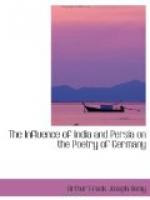Du fingst im lieblichen Trugnetz
der Haare die ganze Welt,—
Als spiegelhaltende Sklavin
gewahre die ganze Welt!
For the first line compare H. 102. 1:
[Arabic]
“there is no one who has not been snared by that doubled tress,” and for the second line compare H. 470. 1:
[Arabic]
“O, thou of whose beauty the sun is the mirror-holder!” In 86 the idea of the young men slain like game by the beauty of the beloved is evidently inspired by H. 358. 6:
[Arabic]
[Arabic]
“in every nook thine eye has a hundred slain ones fallen like me,” and the following lines in the same poem 86:
O welche Pfeile strahlt zu
mir dein Antlitz,
Und es befreit kein Schild
von deiner Schoenheit,
remind us of H. 561. 7:
[Arabic]
“thine eye causes
the arrow (lit. poplar) to pass through the
shield of life.”
* * * * *
Again and again we meet with allusions to the famous image of the love of the nightingale for the rose (35, 75, etc.) so common in Persian poetry, especially in Hafid. We cite only 318. 1:
[Arabic]
“the whole thought of the nightingale is that the rose may be his beloved; the rose has in her thought how she may show grace in her actions.” In 302. 1 the nightingale is called [Arabic] “the rose’s bride.”
Besides this, the poems teem with characteristic Persian metaphors: the moth longing for the flame (37, H. 187. 7); the tulip-bed glowing like fire (67, H. 288. 1); the tulip-cheek [Arabic] (whence Moore’s Lalla Rookh), | (70, H. 155. 2); the musk-perfumed hair | (73, H. 33. 4); the garden of the face (73, H. 33. 4); the pearl of Aden | (77, H. 197. 10 and 651); wine as a ruby in a golden cup (82, H. 204. 8 | “O thou, the golden cup is made full of ruby"); the eye-brows like the crescent-moon (82, H. 470. 5 | “brow like the new moon"); the dust on his love’s threshold (83, H. 497. 10 |); the sky playing ball with the moon (14, inspired by some such couplet as H. 409. 7); and the verses like pearls (43). For this compare H. 499. 11:
[Arabic]
“like a string of lustrous pearls is thy clear verse, O Hafid.” We might multiply such parallels, but those given bear out our statement in regard to the imitation of Persian rhetorical figures on the part of Platen.
In the eagerness to be genuinely Persian, the poet was not content, however, with imitating only what was striking or beautiful; he introduces even some features which, though very prominent in Eastern poetry, will never become congenial to the West. Thus the utter abjectness of the Oriental lover, who puts his face in the path of his beloved and invites her (or him) to scatter dust on his head (H. 148. 3), is presented to us with all possible extravagance in these lines of 87:




